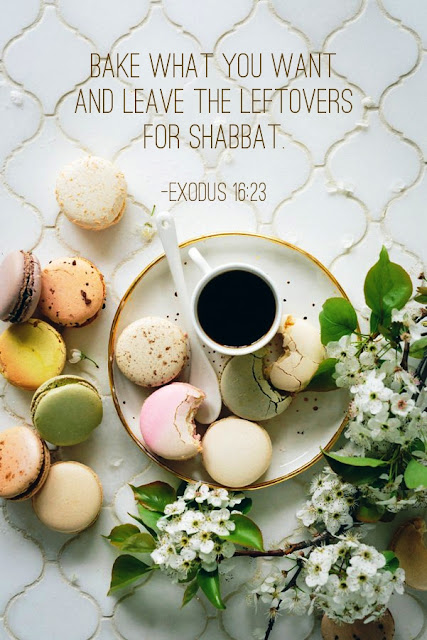In this post I'd like to talk about the workload the Israelites were under when they were enslaved in Egypt. We know they did hard work and manual labor. We know their slavers at least occasionally attacked them physically (a young Moses was so angry to see the harshness an Israelite was treated with that he killed the assailant). We know that the children of Israel cried out to YHWH because of the slavery. But we don't often hear about how much they worked.
The Bible paints a picture of the Israelites working every day. The text doesn't expressly say this, but it can be inferred from the exchange that Moses and Pharaoh have in Exodus 5, and the fact that once they were freed they needed to be taught to have a rest day each week.
At the beginning of Exodus 5, Moses doesn't seem to be asking for all-out release of Israel from slavery...he initially asks Pharaoh for permission for the Israelites to take a three day journey into the wilderness to celebrate a festival (5:1, 3). He seems to be requesting vacation time from work.
Pharaoh's response to this tells us a lot. This request has angered him. How does he reply to Moses? He doesn't suggest they take a shorter trip over the weekend or use their day off to have their festival. In Exodus 5:4, he says to Moses and Aaron, "Why do you take the people from their work?" Pharaoh is asking, "Why would you have the people stop working? Why would you give them a day off?"
That certainly seems like the Israelites didn't have too many off days, but even if they were getting a day off here or there, it's probable that it was less than one out of every seven days, given that the command for a weekly Sabbath is repeated several times once they are freed. We see that this request for time off angered Pharaoh so much that he increased their workload, requiring them to make the same amount of bricks but now making them gather the straw needed to do so. This was a significant enough increase in work that Scripture records the Israelite slaves confronting Pharaoh about the unreasonableness of this new demand. So even if the Israelites actually did have some occasional days off before, they were certainly gone after they were forced to gather straw themselves.
On a side note, ancient Egypt had a calendar system that had 'weeks' that were ten days long. It's not super relevant for our purposes here; the main point is that they were working every day of the week, however long that week was. The work schedule and calendar system of Egypt does give us insight into why the seven day week and the day of rest needed to be taught to the Israelites.
Something we need to take notice of in this story is that it seems to indicate that a lack of time off is a serious impediment to worshipping YHWH. We know the Israelites had some sort of relationship with the Living God, they had cried out to him for freedom after all, but the enslaving powers had blocked them from having festivals and holidays to worship God. They were withheld rest, and Sabbath rest is worship.
This has some huge implications for how we are using our time.
More and more companies and workplaces are demanding seven day availability from their employees. This can be disguised in language like, "flexible schedules," "weekend availability required," or "time and a half overtime pay." In some cases it can literally be a requirement to work seven days a week for a stretch (I talked to a man once who had just worked a shift for the 106th day in a row), but it can also be things like not being given set days off, or having a schedule of 'four on/four off' or something similar. And in the internet age it can also look like being expected to check email over the weekend or check in on Slack every day, as if you have nothing more important to do with your time than constantly be tethered to work.
Not only are expectations like this a huge emotional drain (any mental health professional will tell you that the pressure to always be working or always be available is detrimental to brain function, and quickly leads to burnout or breakdown), causing havoc at any attempt at a healthy work/life balance, but this expectation is literally unbiblical and ungodly. If you are an employer or manager and you're expecting the people who work for you to be available seven days a week or to check in with work every day, then you are doing things Pharaoh's way and not God's.
Keeping people busy all the time is keeping people from God's best for them. It is robbing them of opportunities to rest and worship on the weekly Sabbath and to take part in the Biblical holidays. That's not to say that you can't have a relationship with God if you are working all the time. Again, we see the Israelites crying out to him when they were slaves. But one of the ten commandments is that we should honor the Sabbath day. If we are not abiding by YHWH's schedule, then we miss out on the good things that come from that.
If you have a business, Scripture requires you to give your employees at least the Sabbath days off. That means they do not work, you do not bother them with work updates or news, and you do not require them to check in on work on that day.
If you have a job that's requiring to much of you right now, please know that this is not a condemnation of you or any sort of judgment. The legitimate need to provide for your family or to pay your rent can put you in some very bad situations in this culture that largely doesn't recognize Biblical commandments. God understands your situation and cares for you. I'll link below to a post with practical ideas on how you can stop working on the Sabbath.
While many businesses and employers are at fault for their expectation of constant reachability and overburdening their employees, we as individuals need to make sure we are doing our part to make sure we are stopping on the Sabbath for rest and worship.
All of us can help others and ourselves to be more able to rest on the Sabbath day. Not running errands or shopping on the Sabbath means stores and restaurants do less business and therefore require less staffing. If I need to ask someone to do something for me, I can wait another day and not interrupt their Sabbath day with my requests. Pay attention and see what things tend to keep you from rest on the Sabbath - what adjustments can you make so that work, housework, email, etc. are not stealing your focus? If you need help with this, I'll post a link to an article that will help, or feel free to reach out and ask for advice!
We are not slaves. We serve YHWH who commands rest each week...let's do our best to not keep the schedule of slavery. In Revelation where it says, "Come out of her, my people," it's talking about certain cultural customs and ungodly behaviors. That includes the seven day work week!
How to Stop Working on the Sabbath
Five Ways to Have a More Peaceful Sabbath
Things That Aren't Required for Sabbath Rest




















































.JPG)

